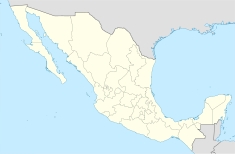Franciscan Missions in the Sierra Gorda
| Franciscan Missions in the Sierra Gorda | |
|---|---|

Mission At Santiago de Jalpan
|
|
| Location | Sierra Gorda, Querétaro, Mexico |
| Coordinates | 21°12′14″N 99°27′50″W / 21.204°N 99.464°WCoordinates: 21°12′14″N 99°27′50″W / 21.204°N 99.464°W |
| Built | 16th Century |
| Built for | Franciscan Order |
| Restored | 1990s |
| UNESCO World Heritage Site | |
| Criteria | Cultural: (ii), (iii) |
| Reference | 1079 |
| Inscription | 2003 (27th Session) |
|
[]
|
|
The Franciscan Missions of the Sierra Gorda in the Mexican state of Querétaro were declared a World Heritage Site by the UNESCO in 2003. They are credited to Junípero Serra of the Franciscan Order, who also founded important missions in Alta California.
The five missions are: Santiago de Jalpan and Nuestra Señora de la Luz de Tancoyol in the municipality of Jalpan, Santa María del Agua de Landa and San Francisco del Valle de Tilaco in Landa, and San Miguel Concá in Arroyo Seco. The facades of these churches are important because of the “Mestizo Baroque” style, which shows significant indigenous influence by the Pame Indians who built them.
The Sierra Gorda is an ecological region centered on the northern third of the state of Querétaro and extending into the neighboring states of Guanajuato, Hidalgo and San Luis Potosí . The region is on a branch of the Sierra Madre Oriental mountain range and consists of a series of mountain chains that run northwest to southeast. Within Querétaro, the ecosystem extends from the center of the state starting in parts of San Joaquín and Cadereyta de Montes municipalities and covering all of the municipalities of Peñamiller, Pinal de Amoles, Jalpan de Serra, Landa de Matamoros and Arroyo Seco, for a total of 250km2 of territory.
...
Wikipedia

